Mixed messages from WHO, CDC on mask-wearing as Delta variant spreads
The World Health Organization urges fully-vaccinated Americans to wear masks indoors in public places as a precaution as the Centers for Disease Control and Prevention sticks to its eased COVID guidance; Bryan Llenas has the details.
As the Delta variant of the COVID-19 virus spreads around the world and within the United States, some in the U.S. are pushing to bring back health measures from the peak of the pandemic, like mask-wearing, even for vaccinated people.
No jurisdiction has reinstituted a mask requirement or other similar mandate yet, and officials in some states have said the evidence currently suggests doing so is unnecessary. But other jurisdictions are raising the alarm that the Delta variant, which was first discovered in India, could require a retreat to pandemic health measures. And some individuals are explicitly calling for mask mandates.
"With increase circulation of the highly transmissible Delta variant, the Los Angeles County Department of Public Health… strongly recommends everyone, regardless of vaccination status, wear masks indoors in public places as a precautionary measure," Los Angeles County said in a statement last week.
Barbara Ferrer, the county's director of public health, acknowledged that vaccines are "very effective" in protecting against the Delta variant. But, she added, "Mask wearing remains an effective tool for reducing transmission, especially indoors where the virus may be easily spread through inhalation of aerosols emitted by an infected person."

Dr. Anthony Fauci, director of the National Institute of Allergy and Infectious Diseases, arrives for a Senate Health, Education, Labor and Pensions Committee hearing to discuss the ongoing federal response to COVID-19 on May 11, 2021, in Washington, D.C. (Greg Nash-Pool/Getty Images)
LA COUNTY ‘STRONGLY RECOMMENDS’ MASKS INDOORS OVER DELTA VARIENT, REGARDLESS OF VACCINATION STATUS
Dr. Anthony Fauci, the U.S. government's chief epidemiologist, is also encouraging vaccinated people to wear masks if they are somewhere with a low vaccination rate. He said on NBC's "Meet the Press" Sunday that there's "good reason" to wear masks if you are vaccinated and in an area where the vaccination rate is low. "Nothing is 100%," he added.
But others experts say the concern about the Delta variant is overblown and returning to strict health measures could be harmful. Johns Hopkins School of Medicine professor Dr. Marty Makary told Fox News that guidance like Los Angeles' "sends the wrong message" for increasing vaccination levels.
"While 40-60% more contagious," Makary said of the Delta variant, "the COVID in all its variant forms is circulating at very low levels in the population. The only people who should be concerned are those who do not have immunity either through vaccination or natural immunity."
"At this point, everyone at-risk has had the opportunity to get vaccinated," Makary continued. "Those who are not immune are choosing to do so at their own personal risk."
Markary added that the initial reasoning for COVID restrictions in early 2020 wasn't to prevent all infection but to prevent hospitals from being overrun. "That is no longer a concern… We have to put things in perspective," Markary said.
The statements from Fauci and Ferrer follow recommendations from the World Health Organization (WHO) that vaccinated people continue to wear masks.
"This continues to be extremely important, even if you are vaccinated," WHO Assistant Director General Mariangela Simao said in a news briefing last month of masking and other measures. "People cannot feel safe just because they had the two doses."
Other places in the United States are leaning toward stronger recommendations on public health measures, especially in crowded situations. Among them is Illinois.
"Illinois' access to and utilization of vaccines has allowed us to remove our capacity restrictions in phase 5 of the Restore Illinois plan," Illinois Gov. J.B. Pritzker said last week. "But it's imperative that we remember that this doesn't meant that the pandemic is over."
"Israel, which has led the world in vaccinations, has reinstated its indoor mask mandate and other mitigations in light of fully vaccinated adults getting infected with the Delta variant," Pritzker added. "It is just out of an abundance of caution I wanted to wear a mask today… When we leave our home every day I would encourage everybody whether you're vaccinated or not to bring your mask with you."
Virginia is not instituting a mask mandate, but the deputy director of its epidemiology office recommends those who are vaccinated continue to wear masks, according to WRIC. And the state, at least for now, is requiring that all people in schools continue to wear masks "regardless of vaccination status."
Others have been more frank in their pro-masking calls.

Illinois Gov. J.B. Pritzker attends the Idas Legacy Fundraiser Luncheon on April 12, 2018, in Chicago. Pritzker urged vaccinated people to bring masks with them when they leave the house last week. (Scott Olson/Getty Images) ((Scott Olson/Getty Images))
UNVACCINATED PEOPLE ENTERING ‘DEATH LOTTERY,’ WEST VIRGINIA GOV SAYS
Dr. Shad Marvasti of the University of Arizona College of Medicine-Phoenix told Yahoo Finance bringing back mask mandates "is a good idea." "We don’t want to wait until after the fact and get caught with this thing already ahead of us when we know that masks work," the doctor said.
And the National Education Association last week considered a resolution from Oakland, Calif., delegate Mark Airgood that would call for mandatory vaccination, mask-wearing and social distancing in schools. The resolution was defeated but reflects the sentiment among some that in-person instruction for students in the fall could be in jeopardy without significant pandemic health measures.
"We need to demand that no student return to in-site instruction until there's vaccines for every student. It makes no sense to bring together young people at a single site, especially when the variants are spreading just as quickly among young people as among adults," Airgood said.
Other officials, meanwhile, are more suspicious of bringing back mask mandates, citing the fact virus numbers are largely down in the U.S.
CLICK HERE TO GET THE FOX NEWS APP
Washington State Epidemiologist Dr. Scott Lindquist told King 5 that the state is "not at this time" reimplementing restrictions because the state's "rates are going down" even with the Delta variant. And Michigan officials say they are not planning to reimplement restrictions, The Detroit News reported.
White House press secretary Jen Psaki said Tuesday the federal government isn't considering implementing new national health measures beacuse of the United States' vaccination rate.
New Jersey Gov. Phil Murphy also touted the fact his state is currently in "really good shape" on coronavirus cases, according to NJ.com.
"I hope we don't have to go back," Murphy added. But, he said, "If we have to, we will, clearly."







